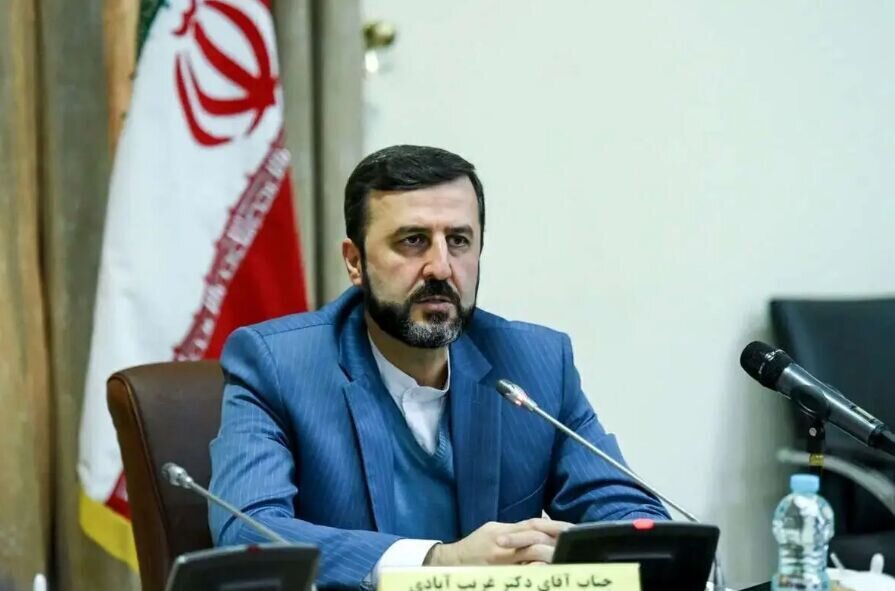Iran calls nuclear talks with E3 ‘serious, frank, and constructive’

TEHRAN – Iran’s Deputy Foreign Minister for Legal and International Affairs, Kazem Gharibabadi, described the latest round of talks with the European trio (E3) – the United Kingdom, France, and Germany – as "constructive."
The discussions, held in Geneva on Monday, focused on the removal of illegal sanctions against Iran and issues related to the country’s civilian nuclear program.
“The talks were serious, frank, and constructive,” Gharibabadi posted on X.
He emphasized that the negotiations delved into details crucial for reaching an agreement on sanction relief and the nuclear issue.
Majid Takht-Ravanchi, Iran’s deputy foreign minister, alongside Gharibabadi, engaged with political directors and deputies of the E3.
Both sides addressed not only the sanctions and nuclear issues but also regional matters and common interests.
Gharibabadi highlighted that there was a consensus on the need to resume negotiations and maintain a conducive atmosphere for reaching an agreement.
The British, French, and German representatives echoed Gharibabadi’s sentiments in a joint statement, acknowledging the serious and constructive nature of the talks.
“Against a challenging context, we discussed concerns and reiterated our commitment to a diplomatic solution. We agreed to continue our dialogue,” they wrote on X.
The recent meeting in Geneva builds upon prior dialogues that took place alongside the UN General Assembly in New York in September and another gathering in Geneva in November.
These discussions followed the adoption of an anti-Iran resolution by the International Atomic Energy Agency's (IAEA) Board of Governors in November 2024.
The resolution, driven by the United States and the European Troika, accused Iran of failing to fully adhere to the Joint Comprehensive Plan of Action (JCPOA) signed between Tehran and the P5+1 in 2015.
The JCPOA, designed to limit Iran’s nuclear program in exchange for the termination of sanctions, was rendered ineffective when, in 2018, Donald Trump unilaterally withdrew the United States from the deal and re-imposed sanctions against Iran.
The re-imposition of sanctions, coupled with European countries' often unconstructive positions, has prompted a series of responses from Iran since 2020, with the latest including the deployment of new advanced centrifuges.
Nevertheless, Iran consistently emphasizes that its primary goal is the termination of sanctions. The country’s officials have repeatedly affirmed this position, stressing the need to enhance national resilience to mitigate the effects of sanctions while remaining open to diplomatic negotiations.
Last month, Iranian Foreign Minister Abbas Araghchi conveyed Tehran's willingness to re-engage in talks with global powers to resolve the protracted impasse over the state of the 2015 nuclear deal.
“The formula we have is the same as the previous JCPOA formula, which is building trust about Iran's nuclear program in exchange for the removal of sanctions. We are ready to negotiate on this basis," he said.
'A step forward'
In a separate X post on Tuesday, Gharibabadi provided details on the second day of discussions, stating, "We had open and constructive discussions with Enrique Mora and his team in Geneva. We exchanged views mainly on nuclear/sanctions lifting as well as other issues of mutual interest."
He also added that they discussed Europe's support for the Israeli regime's crimes in Gaza.
Enrique Mora, the EU's coordinator for the JCPOA talks, also wrote about the meeting, saying, "Good and serious discussions in Geneva. [Our] focus [was] on nuclear issues, sanctions lifting, and regional concerns."
"It was a step forward in our dialogue with Iran," he added.
Although these rounds of negotiations with the European Troika are scheduled to continue, skepticism regarding this approach persists among some voices within Iran.
Ebrahim Azizi, Chairman of the Parliament's National Security and Foreign Policy Committee, said on Sunday: "Unfortunately, Europeans sometimes participate in negotiations without independence in decision-making and follow the coercive policies of the U.S."
He added that their lack of autonomy is not only unproductive but also disgraceful to themselves.
Leave a Comment